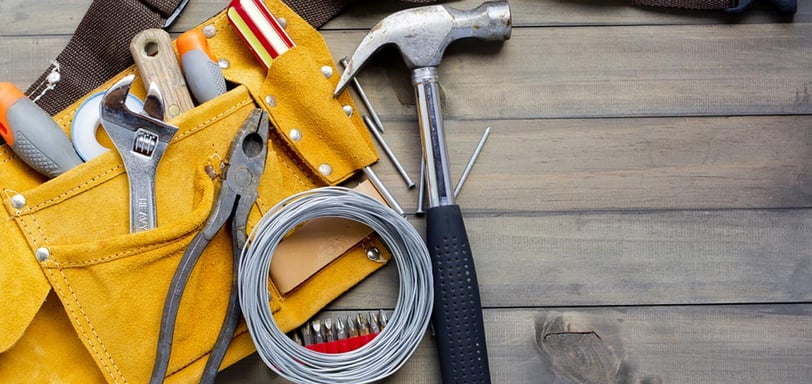Metrics that Matter - Handyman Services


Metrics That Matter: What Handyman Service Business Owners Need to Know Before Selling
Handyman businesses are often the unsung heroes of the home services world, flexible, in demand, and often built on strong customer relationships. In a state like Florida, where homeownership, seasonal residents, and aging properties drive constant demand, owning a handyman service can be both profitable and rewarding.
But when it comes time to sell, buyers are looking beyond how busy you are. They want clear insights into your financials, operational systems, licensing compliance, and most importantly, whether your business can run without you.
This article breaks down the key metrics that buyers analyze, outlines Florida-specific legal and licensing issues, and offers actionable steps to help you prepare your handyman service business for a successful, high-value exit.
Why Metrics Matter When Selling a Handyman Business
Buyers evaluate a handyman business not just on how many jobs you book, but on whether the business is:
- Profitable and sustainable
- Systemized and scalable
- Compliant with state laws and licensing requirements
- Not overly dependent on the owner’s skills or reputation
- Able to generate recurring or referral-based business
The better these metrics are, the easier it is to attract serious buyers, and command a stronger valuation.
Florida’s Handyman Market: Why Buyers Are Interested
Why Florida?
High rates of homeownership, vacation properties, and retirees = constant small repair needs.
A large population of seasonal residents who rely on trusted professionals to maintain their homes.
Aging homes, HOA communities, and property managers frequently need minor maintenance services.
Who’s Buying?
Owner-operators looking to step into a turnkey route.
Home service companies expanding their service lines.
Investors or franchise buyers seeking recurring income streams.
What Buyers Care About:
Whether the business is dependent on the owner or has a trained team.
How jobs are sourced - repeat customers, referrals, or inbound marketing.
Pricing structure, margins, and consistency of job flow.
Licensing compliance - especially for work that may fall under Florida contractor law.
Top Metrics Buyers Analyze in a Handyman Services Business
1. Job Volume and Type of Services
What It Is: How many jobs you perform per month and the scope of services offered (e.g., drywall repair, painting, furniture assembly, minor plumbing/electrical, etc.).
Why It Matters: Buyers want to know how steady the work is and whether it’s within legal scope.
What Good Looks Like:
Consistent monthly job flow with a balanced mix of small, medium, and recurring jobs.
Red Flags:
Sporadic work with seasonal dips or inconsistent job types.
2. Average Ticket Size and Job Frequency
What It Is: Average revenue per job and how often repeat clients call.
Why It Matters: Indicates revenue predictability and client satisfaction.
What Good Looks Like:
$150–$500 average job size, depending on the service area and scope.
Repeat clients booking multiple times per year.
Red Flags:
Low ticket value or high dependence on one-off customers.
3. Gross Profit Margins
What It Is: Revenue minus direct labor, materials, and other job costs.
Why It Matters: Shows how well you price jobs and manage efficiency.
What Good Looks Like:
Gross margins of 40–50%, especially on labor-heavy tasks.
Red Flags:
Low margins due to underpricing, scope creep, or travel inefficiencies.
4. Customer Concentration and Referrals
What It Is: Percentage of revenue from top clients and sources of business.
Why It Matters: A diversified client base and strong referral engine make the business more valuable.
What Good Looks Like:
No client accounts for more than 10% of total revenue.
A healthy mix of repeat clients, referrals, and inbound marketing leads.
Red Flags:
Over-reliance on one realtor, property manager, or individual customer.
5. Licensing & Legal Compliance (Florida-Specific)
What It Is: Whether the business performs work that requires a Florida contractor’s license, and whether the owner or staff holds it.
Why It Matters: Florida law limits what unlicensed handymen can legally do.
What Good Looks Like:
Staying within legal scope or holding a Certified Contractor License (if performing plumbing, electrical, structural, or significant remodels).
Proper insurance: general liability and workers’ comp.
Red Flags:
Performing regulated work (e.g., major plumbing, HVAC, electrical) without a license.
No coverage for on-site accidents or property damage.
6. Owner Dependence vs. Team Operations
What It Is: How involved the owner is in performing jobs vs. managing the business.
Why It Matters: Buyers prefer businesses that can run without the seller.
What Good Looks Like:
Documented processes, scheduling systems, and trained technicians or subcontractors in place.
Red Flags:
Owner performs all the work, handles all calls, quotes every job, and has no SOPs.
Operational Elements That Impact Value
Use of field service software (Jobber, Housecall Pro, Service Fusion).
Online booking and customer communication tools.
Standard operating procedures (SOPs) for quoting, scheduling, and safety.
Well-maintained tools, vehicles, and inventory.
Clean, well-branded website and review presence (Google, Yelp, Nextdoor).
CPA-reviewed financial records and a consistent invoicing system.
Common Mistakes Sellers Make in the Handyman Industry
Performing unlicensed work - which creates liability and legal risk.
Mixing personal and business finances - makes due diligence harder.
No system for quoting or scheduling - the business appears disorganized.
Underpricing jobs to win work - buyers see this as a profitability risk.
No customer database or CRM - hard to prove customer relationships.
Lack of employee or contractor documentation - unclear who’s doing the work.
Actionable Tips to Improve Key Metrics Before Selling
Document your scope of services - stay within what’s legally allowed or ensure proper licensing.
Formalize repeat client relationships - offer seasonal maintenance packages or service agreements.
Implement job management software - streamline quoting, invoicing, and scheduling.
Raise prices strategically - ensure margins match the value you provide.
Create SOPs - document how work is scheduled, quoted, and completed.
Train and retain team members - invest in stability and scalability.
Clean up your financials - CPA-reviewed, with job cost tracking and clean P&Ls.
Strengthen your online presence - build reviews, update your website, and highlight testimonials.
Conclusion: Preparing Your Florida Handyman Business for Sale
Handyman service businesses are uniquely attractive because they’re low-overhead, highly in-demand, and often built on trust and reputation. But to sell your business for a strong price, it must be compliant, profitable, systemized, and scalable.
By focusing on the right metrics, ensuring you’re operating within Florida’s licensing laws, and preparing your operations for a smooth transition, you’ll make your business more appealing to buyers and increase your chances of a fast, profitable sale.
Thinking of selling your Florida handyman business?
Contact us for a confidential consultation and learn how to position your business for maximum value.
